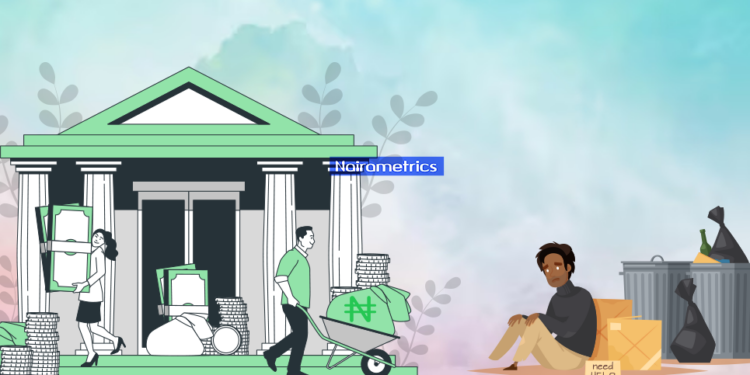Inflation Pushes Nigerians to Borrow $3 Billion from Banks in Three Months
Consumer credit outstanding in Nigeria surged by 268.9% to N8.24 trillion by the end of March 2024, from N3.42 trillion in December 2023, reflecting the severe financial strain on Nigerians due to escalating inflation.
- Advertisement -
The rising cost of living has pushed Nigerians to borrow about N4.82 trillion from banks between January and March this year.
Consumer credit outstanding in Nigeria surged by 268.9% to N8.24 trillion by the end of March 2024, from N3.42 trillion in December 2023, reflecting the severe financial strain on Nigerians due to escalating inflation.
- Advertisement -
This is according to the First Quarter 2024 Economic Report published by the Central Bank of Nigeria (CBN).
- Advertisement -
Personal loans dominate consumer credit
The report shows that the surge in consumer credit was primarily driven by a significant rise in both personal and retail loans.
However, personal loans constitute the largest portion of consumer credit, rising by 270.4% to N7.52 trillion by the end of March 2024.
Similarly, retail loans saw a significant increase of 253.4%, reaching N721.13 billion.
This growth indicates a heightened reliance on credit to manage personal finances, with personal loans accounting for a dominant 91.2% share of total consumer credit.
The report read: “Consumer credit outstanding grew by 268.9 per cent to N8,240.36 billion at end-March 2024, relative to the level at end-December 2023. The substantial growth in consumer credit was attributable to inflation expectations.
“A disaggregation of consumer credit showed that personal loans increased by 270.4 per cent to N7,519.2 billion, while retail loans increased by 253.4 per cent to N721.13 billion. Personal loans remained the principal component of consumer credit, with a 91.2 per cent share, while retail loans accounted for the balance.
“As a proportion of total sectoral credit, consumer credit increased to 15.5 per cent, from 7.7 per cent in end-December 2023.”
Nairametrics further observed that personal loans have consistently dominated the consumer credit landscape, with their share steadily increasing.
- Advertisement -
In March 2023, personal loans accounted for 74.54% of total consumer credit, while retail loans made up 25.46%.
Over the following months, the share of personal loans continued to rise, reaching 77.53% by December 2023 and 91.25% by March 2024.
Conversely, the proportion of retail loans has seen a significant decline, dropping from 25.46% in March 2023 to just 8.75% by March 2024.
This shift shows the growing dependency on personal loans as the primary source of consumer credit, likely reflecting the urgent financial needs of individuals in an increasingly challenging economic environment.
The decline in the share of retail loans suggests that consumers may be focusing more on securing funds for immediate personal needs rather than retail or commercial purposes.
What you should know
The surging inflation has left many Nigerians groaning under the weight of the skyrocketing cost of everything from food to fuel and rent.
In the first quarter of 2024, Nigeria’s headline inflation rate rose from 28.92% in December 2023 to 33.2% in March 2024, an increase of 14.80%.
This was as rising inflation and weak earnings pushed 10 million Nigerians into poverty in 2023, according to a World Bank report.
However, while it is still high, Nigeria’s headline inflation rate decreased to 33.40% in July 2024, down from 34.19% in June 2024, according to a recent report by the National Bureau of Statistics (NBS). This marks the first decline in the headline inflation rate since December 2022, when it last dropped to 21.34%.
Source:norvanreports.com
- Advertisement -


